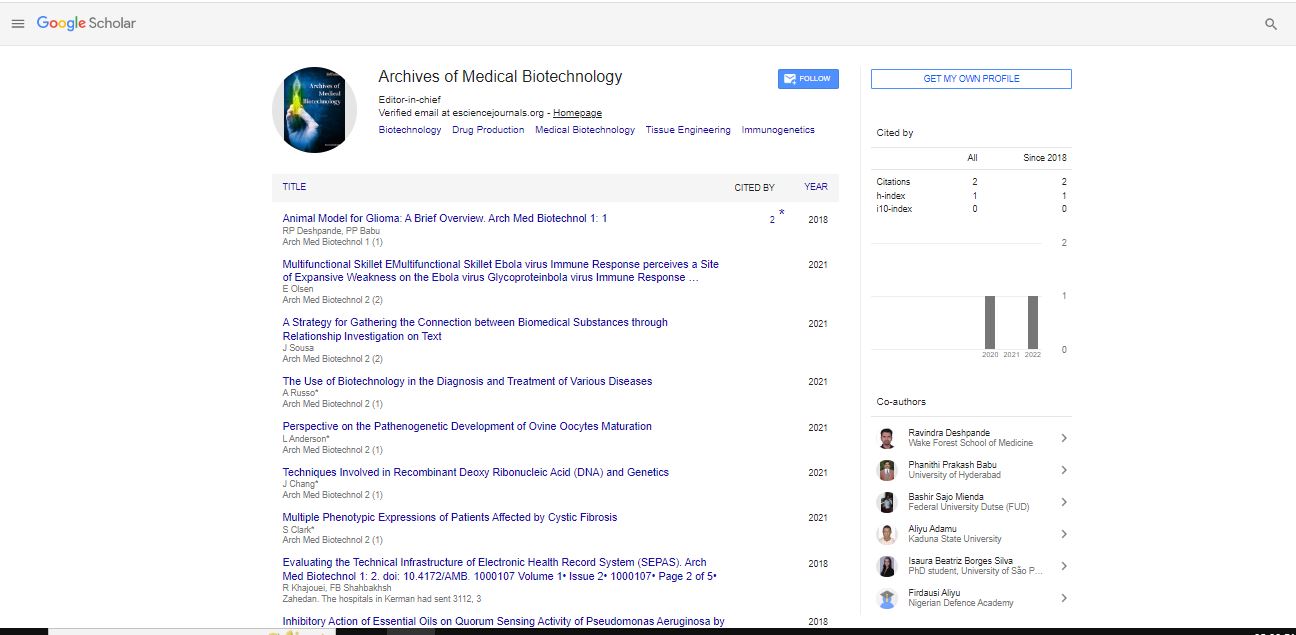Perspective, Arch Med Biotechnol Vol: 4 Issue: 3
Innovations in Drug Production: Revolutionizing Medicine for a Healthier Tomorrow
Shadow Xiao*
1Department of Chemical Engineering, Cyprus University of Technology, Limassol, Cyprus
*Corresponding Author: Shadow Xiao,
Department of Chemical Engineering,
Cyprus University of Technology, Limassol, Cyprus
E-mail: xiaos39@gmail.com
Received date: 30 August, 2023, Manuscript No. AMB-23-117779;
Editor assigned date: 01 September, 2023, PreQC No. AMB-23-117779 (PQ);
Reviewed date: 15 September, 2023, QC No. AMB-23-117779;
Revised date: 22 September, 2023, Manuscript No. AMB-23-117779 (R);
Published date: 02 October, 2023, DOI: 10.4172/amb.1000054
Citation: Xiao S (2023) Innovations in Drug Production: Revolutionizing Medicine for a Healthier Tomorrow. Arch Med Biotechnol 4:3.
Description
The pharmaceutical industry is at the forefront of innovation, constantly evolving to meet the growing demand for new and effective medicines. In recent years, drug production has seen remarkable advancements that promise to transform the way we develop and deliver medications, ultimately improving healthcare outcomes for millions. This article explores the cutting-edge innovations in drug production and their potential to revolutionize medicine.
Personalized medicine.
One of the most significant breakthroughs in drug production is the shift toward personalized medicine. This approach tailors treatments to individual patients based on their unique genetic makeup, lifestyle, and specific health needs. Advances in genomics have made it possible to identify genetic markers that influence a person's response to various drugs. With this knowledge, pharmaceutical companies can create medications that are more effective and have fewer side effects. By harnessing the power of big data and artificial intelligence, drug production can now target treatments at a molecular level, ensuring a more accurate and efficient approach to healthcare.
3d printing in drug manufacturing
3D printing technology has found its way into the pharmaceutical industry, opening up exciting possibilities for drug production. This innovative technique allows for the precise fabrication of pharmaceutical products, enabling the creation of unique drug formulations, dosages, and delivery methods. In addition, 3D printing can reduce production costs and improve drug accessibility, particularly for rare diseases or conditions that require specialized treatments.
Continuous manufacturing
Traditionally, pharmaceutical manufacturing has been a batch process with frequent starts and stops, making it time-consuming and resource-intensive. However, continuous manufacturing is changing the game. This method involves a seamless flow of materials and processes, reducing the need for large-scale infrastructure and minimizing waste. It not only increases production efficiency but also enhances product quality and consistency, ultimately bringing cost savings to the pharmaceutical industry.
Ai-driven drug discovery
Artificial Intelligence (AI) is revolutionizing the drug discovery process by dramatically accelerating the identification of potential compounds and streamlining clinical trials. Machine learning algorithms can analyze vast datasets and predict drug candidates with high precision, drastically reducing the time and resources required for research and development. AI can also be used to optimize drug formulations, making treatments more effective and accessible.
Advanced drug delivery systems
Innovations in drug delivery systems are changing how medications are administered, enhancing patient compliance and treatment outcomes. Nano and micro technologies enable the creation of drug carriers that can precisely target affected areas in the body. This not only reduces side effects but also allows for the development of new therapies, such as gene and cell therapies. These advancements have the potential to revolutionize treatments for cancer, diabetes, and other complex diseases.
Green and sustainable drug production
Sustainability is a critical consideration in modern drug production. The pharmaceutical industry is increasingly focused on eco-friendly practices, aiming to reduce its environmental impact. Green chemistry principles are being applied to develop cleaner, more sustainable production processes, resulting in reduced waste, lower energy consumption, and fewer harmful byproducts. By embracing sustainable practices, the pharmaceutical industry is working toward a healthier planet while creating healthier communities.
Remote monitoring and telemedicine
The COVID-19 pandemic accelerated the adoption of telemedicine and remote monitoring, offering new opportunities in drug production and distribution. These technologies allow healthcare providers to monitor patients' health remotely and adjust treatments as needed. This not only improves patient care but also supports a more efficient supply chain for medications.
Conclusion
The landscape of drug production is evolving rapidly, thanks to these innovative advancements. Personalized medicine, 3D printing, continuous manufacturing, AI-driven drug discovery, advanced drug delivery systems, sustainability, and remote monitoring are transforming the way we develop, manufacture, and distribute medications. These breakthroughs promise a future of more effective treatments, reduced costs, and enhanced patient outcomes, ultimately improving healthcare for everyone.
 Spanish
Spanish  Chinese
Chinese  Russian
Russian  German
German  French
French  Japanese
Japanese  Portuguese
Portuguese  Hindi
Hindi 